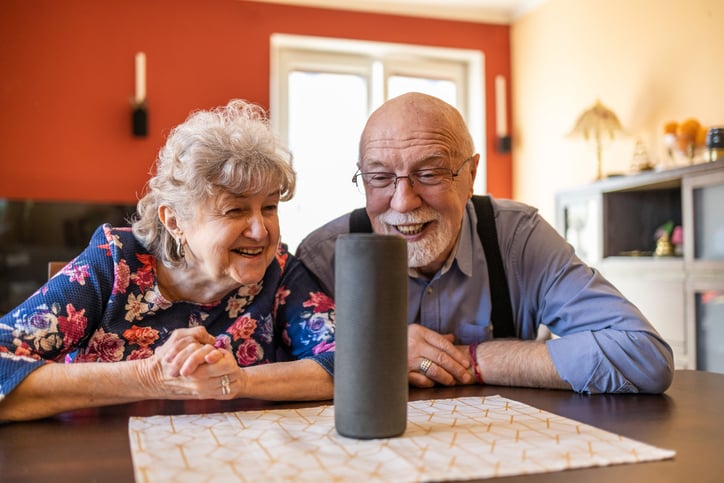Best Technology to Help Seniors Living at Home

Seniors who are still living at home can always benefit from a little technology. Installing smart technology within the home like security systems, smoke detectors and home assistants like Amazon’s Alexa could not only make your loved one’s life easier, but also protect them from painful falls and other emergency situations. If your loved one is open to technological assistance at home, here are a few of our top recommendations from our reputable home health aides across New Jersey.
#1 – Smart smoke detectors
Every home should have smoke detectors, but when you have impaired hearing or mobility, it can help to upgrade to something with a little more functionality. Depending on the type of smart smoke detector, you can rig it to not only activate a siren if smoke or carbon monoxide is detected, but also to alert specific friends, neighbors, or family members by sending a notification to your smartphone. Some, like the Google Nest Protect, can also send you additional information such as which room the alert came from, run self-tests to make sure everything is in working order, and activate a motion-detection night light feature.
#2 – Wearable emergency contact tech
One of the greatest fears of any senior and their loved one is being unable to reach emergency services when they’re needed. Wearable tech is a simple way to make sure that whatever happens, emergency services can be contacted immediately. Whether it’s a fall on icy stairs, a slip in the bathroom, accidentally getting locked out, or a medical emergency, you’ll have a way to get the help that’s needed. Luckily, wearable tech like the Apple watch, Reemo Smartwatch and Fitbit Sense can be very sleek, stylish and unobtrusive, so it doesn’t carry the stigma that many medical alert items have. In fact, the grandkids are going to be jealous!
#3 – A home assistant
You’ve probably come across home assistants before. You might even have one in your home now, so it’s easy to see why they can be really useful for seniors. Not only can your loved one ask the assistant to call 911, a family member, or a friend if they need help, but they can also check the weather forecast, schedule appointments, set up medication reminders, stream music and control other smart devices (even lights and the TV). These devices, which include the Amazon Echo, Apple HomePod, and Google Nest, are good alternatives to wearable technology. The only con is that they have to stay in the home in order to connect to Wi-Fi, while wearable tech is fully operational wherever you go.
#4 – Smart sensors
Sensors can be placed around the home in certain areas to help a senior maintain independence while staying safe. This isn’t usually necessary for seniors in very good health, but for those with early on-set dementia conditions (or a partner with dementia) they can be incredibly useful. For example, sensors on the doors and windows can alert you if they are sitting open, are shut, or have been open beyond a reasonable amount of time. You can see when people are coming or going, if the door has been left open in winter while the dog went out, or if the refrigerator door has been left open after getting a snack. When looking at sensors, find some that are compatible with the home assistant device, or choose a standalone device like the Monoprice Stitch wireless door/window sensor.
#5 – Smart security cameras
A live camera feed can be very useful when you’re caring for your loved one from afar, and more tech-savvy seniors get plenty of use out of them too. Keeping in mind that this isn’t about surveillance but peace of mind, it can help to have a security feed that gives you access to important areas of the home such as the front and back door areas and maybe the kitchen. With your loved one’s consent, camera feeds can be used for making sure the home is safe and secure, giving emergency responders key information if a fall, fire, or emergency occurs, or even giving a wave over the breakfast table each morning. Again, it’s important that the cameras are compatible with the home assistant if there is one. Otherwise, you can use a Wyze cam or Arlo Q cam.
Assistance at home through technology and home health aides
When it comes to technology, there are so many ways to help seniors stay safe and independent at home. Remember to always get your loved one’s consent before you introduce something new, be aware of their privacy and be sure to show off the fun side of this tech!
While technology is a great addition to keep your loved one safe at home, nothing beats the help of a real person who has their best interest at heart. If you’re interested in extra assistance at home for your senior parent, talk to the team at UMC HomeWorks about getting a qualified, experienced, and trustworthy home health aide in NJ. You can also look at our website for more information on how our innovative program works:
https://umcommunities.org/homeworks/






